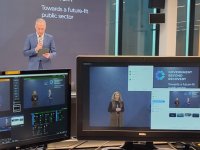Posts on Anticipatory Innovation & Foresight
This OPSI guest blog is written by Professor Leon Fuerth and Dr Sheila Ronis. Both served as co-researchers on The Project on Foresight and Democracy, funded by Rockefeller Brothers Fund and are currently co-directing the Project on Civic Leadership for the 21st Century at The Ohio State University. In the United States, liberal democracy is profoundly challenged by the accelerating rate of major forms of societal change, reflecting demographic transitions and technological revolutions. These…
Will in-person work be a distant memory 15 years from now? Will ministries’ offices only exist in cyberspace? Or will AI-powered bots become the norm when interviewing potential job candidates? While the answers to many questions like these are impossible to know today, one thing is certain: working in the future will be very different from what it is now. This will not only be determined by new innovative technologies, the disappearance of certain jobs...
“What is innovation, anyway?” It is a question we are asked at the OECD Observatory of Public Sector Innovation (OPSI) every day. The concept of innovation is varied and confusing. Intentionally managing and steering innovation in governments even more so. While the OECD’s public sector innovation definition outlines that innovation is something that is novel to the context, implemented and brings about impact (for example in the form…
What if our minds could move through time as easily as our bodies can move through space? In the movie Arrival (minor spoiler alert!), linguistics professor Dr Louise Banks learns an extraterrestrial language that expresses ideas in a timeless and nonlinear way. Through some science-fiction magic grounded in a grain of truth, Banks gains the ability to perceive time itself differently, and experiences flashes of future moments of great personal and…
Virtual Conference – Government Beyond Recovery: Towards a future-fit public sector: 18-19 October 2021 As we hurry to buy plane tickets to the next tropical destination or catch the latest James Bond movie in theatres, the sudden and dramatic restrictions we all experienced in early 2020 can feel like a distant memory. In the early days of COVID-19, many of us reflected critically on the things that mattered most in our lives and work; committing...
Intermediary report launch Over the past year the Observatory of Public Sector Innovation (OPSI) has worked together with the Government of Finland and the European Commission to build an anticipatory innovation governance model. As part of the work, the OECD assessed the current public policy steering system of Finland and its anticipatory capacity – the first results of the work are presented in a report accompanying the blog. Building an anticipatory innovation governance model First,...
This is a guest post from Anne Pordes Bowers and Peter Glenday of SOIF, the School of International Futures. COVID-19 has underlined the importance of thinking systemically about the future, even though our institutions are not well structured or incentivised to do this. More urgently than ever, governments need to reinvent how they do strategy and policymaking. Strategic foresight is an organised, systematic way of looking beyond expected trends to better assess uncertainty and complexity....
As a devoted fan of the Eurovision Song Contest (ESC) for over 20 years, the coronavirus pandemic brought a big disappointment for me in 2020: the cancellation of the most important week of my year. As I had done in Kyiv, Lisbon, and Tel Aviv, I planned to travel to Rotterdam to see the live shows and embrace dear friends from all over the world in this joyful and camp annual extravaganza of music and...
On March 11-12, 2021, more than 450 futures, foresight and innovation experts from 72 countries around the world gathered digitally to discuss the latest on anticipatory innovation governance. Over three sessions, the emerging Anticipatory Innovation Governance (AIG) model was explored, together with the future of the public sector, and tools and methods for anticipation. The series of sessions were co-hosted with the Government of Finland and supported by the European Commission’s Horizon…
Anticipatory innovation governance model – humble, yet ambitious Governments tend to look like powerful, overwhelming forces that are difficult to stop or change. Juggernauts if you will. Yet governments over decades have reformed a lot: they adopted new (and given away) services and tasks together with technological and societal development. They have taken on different public administration paradigms, successful and otherwise. The change, however, has been slow and, at times, painful. We all…










